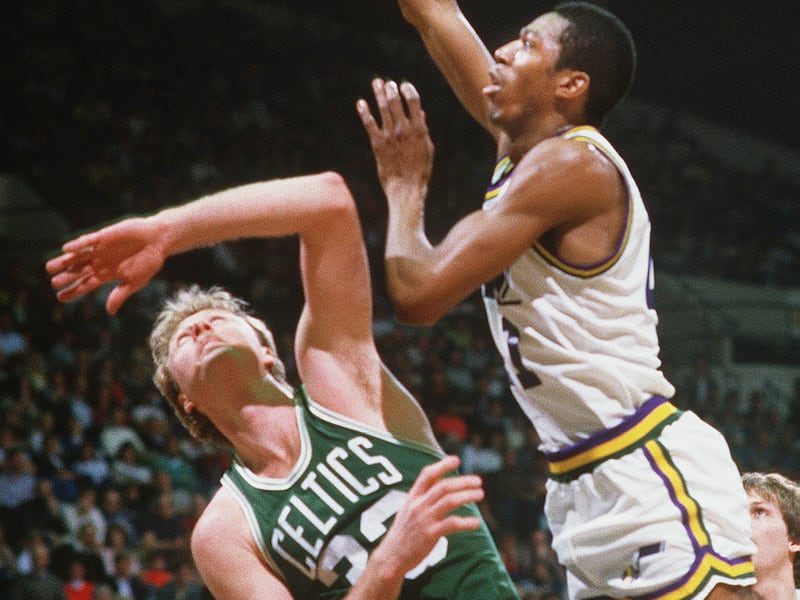Editor’s note: Second in an occasional series reminiscing about games not to be forgotten.
Among the many basketball games I got paid to watch back in the days when I was a sports writer, one I won’t soon forget is the night Larry Bird decided making history was not that big a deal.
Bird and the Boston Celtics were visiting the Salt Palace to play the Jazz on Feb. 18, 1985. The Celtics were defending NBA champions, in the midst of a seven-year run that would include five trips to the NBA finals and three championships. Visiting Salt Lake City on a clear, cold February night, their 43-11 record led the league.
At 25-28 midway through their sixth season in Utah, the Jazz were inching their way to respectability. They had a rookie point guard named John Stockton, who would be joined the next year by a power forward named Karl Malone. But the Delta Center (now Vivint Arena) was yet to be built and Stockton Drive and Malone Drive were still known as 300 West and 100 South.
Bird was the Celtics leader. Think Russell Westbrook, James Harden and Kawhi Leonard rolled into the same body — and in 1985 he still had a good back.
Bird was the Celtics leader. Think Russell Westbrook, James Harden and Kawhi Leonard rolled into the same body — and in 1985 he still had a good back. He was the league MVP the year previous, would be named MVP this season, and again the next.
At the end of the first quarter, the Celtics led 34-10 and Larry Bird had more points than the entire Jazz team. Jazz coach Frank Layden said, “Forget Boston, let’s beat Bird.”
By the end of three quarters, Boston led 90-68 and Bird, who was already resting comfortably on the bench, had 30 points, 12 rebounds, 10 assists and nine steals.
Thinking the Celtics might like to know this information, the stat crew at the Salt Palace sent a note to Celtics coach K.C. Jones. If Bird got one more steal he would have the first quadruple-double in league history involving points, rebounds, assists and steals. (Nate Thurmond had recorded the NBA’s lone quadruple-double in 1974, but it was points-rebounds-assists-blocks.)
Jones went to the end of the bench, knelt in front of Bird and delivered this information.
Bird shook his head sideways, left his warmups on, and never reentered a game the Celtics ended up winning easily.
In the visitors locker room, reporters surrounded Bird, asking why he didn’t go back in the game.
He said he didn’t see the point. The game was already in hand. Why rub it in? I distinctly remember him saying, “That’s not why I play.” Apparently, numbers didn’t mean that much to him
I was writing a column, not the game story, so I hung out in the locker room till all the questions had been asked. As I was leaving, I looked back and saw Bird, all alone at this point, pick up a stat sheet. He spent a moment looking it over, then let it drop to the floor.
Did Bird have second thoughts? Did he wish he hadn’t sat out the entire fourth quarter and part of the third? Did he regret not going back in long enough for one more steal?
I wondered what went through his mind. It was right there in black and white: how close he’d come. A quadruple-double in basketball is a rare thing, much rarer than, say, a hole-in-one in golf, or a no-hitter in baseball. True, since the NBA didn’t start tracking steals until 1973-74, there might have been a quad-double by Oscar Robertson or maybe Wilt Chamberlain in their prime, but the fact is, in the almost half-century since steals have been compiled, there’s been only one points-rebounds-assists-steals quadruple-double in the NBA — by Alvin Robertson of the San Antonio Spurs in 1986. (20, 11, 10, 10).
Did Bird have second thoughts? Did he wish he hadn’t sat out the entire fourth quarter and part of the third? Did he regret not going back in long enough for one more steal?
Fast forward seven years to the Olympic Games of 1992 in Barcelona, Spain, and I think I got my answer. The U.S. basketball team that included Jordan, Magic, Barkley, Ewing, Stockton, Malone, Bird, et al — aka the Dream Team — had just locked up the gold medal by beating Croatia in the championship game. While winning eight straight games throughout the Olympics, the U.S. had won by an average of 43.8 points.

I’d seen every one of those eight games, an eyewitness to the demolition while covering Stockton and Malone for the Deseret News. In the interview area after the final game, I circulated around the room, getting quotes as player after player exulted in winning gold in such dominating fashion.
Everyone except Bird. His response: “I wish it had been more competitive.”
The greatest basketball team ever assembled had just planted its flag on the summit, and there’s Bird, wishing the dadgum games had been closer.
I’m pretty sure he never gave another thought about just missing that quadruple-double on a February night in Salt Lake City in 1985.


